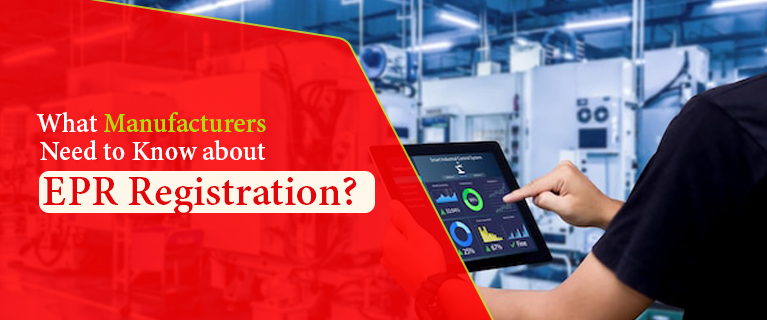How EPR Certification Promotes Responsible Consumption?
In today's globalised and interconnected world, there is a growing awareness of the need for responsible consumption and production practices. As environmental concerns continue to rise, businesses are seeking ways to reduce their environmental footprint and contribute to sustainable development. One effective approach to achieving this goal is through EPR (Extended Producer Responsibility) certification. EPR certification promotes responsible consumption by placing the onus on manufacturers and producers to manage the entire lifecycle of their products, from production to disposal. In this blog, we will explore how EPR certification promotes responsible consumption and its benefits for businesses and the environment.
1. Shifting the Burden from Consumers to Producers:
EPR certification is based on the principle that producers and manufacturers have a shared responsibility for the entire lifecycle of their products, including their disposal. Traditionally, the burden of waste management and disposal fell on consumers and local municipalities. However, with EPR certification, producers are now accountable for the proper management and recycling of their products, ensuring that waste is minimised and resources are conserved.
2. Encouraging Sustainable Design and Product Innovation:
EPR certification incentivizes producers to design products with a focus on sustainability and resource efficiency. By taking responsibility for the entire product lifecycle, producers are motivated to create products that are easier to recycle, repair, or upgrade. This encourages sustainable design practices and stimulates product innovation, leading to the development of more environmentally friendly and durable products.
3. Effective Waste Management and Recycling Programs:
EPR certification drives the implementation of effective waste management and recycling programs. Producers are required to establish collection systems, collaborate with recycling facilities, and ensure proper disposal of their products at the end of their life. This helps to reduce landfill waste, conserve resources, and minimise environmental pollution. By promoting responsible disposal and recycling practices, EPR certification contributes to the circular economy and the conservation of natural resources.
Read Also This - EPR Registration as a Solution to a Cleaner Environment4. Cost Reduction and Efficiency:
Implementing EPR certification can lead to cost reduction and increased operational efficiency for businesses. By designing products with recycling and end-of-life management in mind, producers can optimise their supply chains, reduce waste generation, and minimise disposal costs. EPR certification encourages producers to adopt more sustainable production practices, such as using recycled materials, reducing packaging waste, and implementing energy-efficient manufacturing processes.
5. Supporting the Circular Economy:
EPR certification is closely aligned with the principles of the circular economy. By taking responsibility for the entire lifecycle of their products, producers contribute to the circularity of resources. Through recycling and proper waste management, materials from discarded products can be reclaimed and reused, reducing the need for raw material extraction and minimising environmental impact. EPR certification facilitates the transition towards a circular economy by promoting the reuse, recycling, and recovery of materials, reducing waste, and conserving valuable resources.
6. Global Sustainability Goals:
EPR certification aligns with various global sustainability goals, including the United Nations Sustainable Development Goals (SDGs). The SDGs emphasise the importance of responsible consumption and production patterns, waste reduction, and environmental protection. By obtaining EPR certification, businesses actively contribute to these goals, demonstrating their commitment to sustainable development and playing a role in addressing pressing global challenges such as climate change and resource depletion.
Read Also This - Financial Implications of EPR Registration7. Spurring Innovation and Collaboration:
EPR certification fosters innovation and collaboration among stakeholders. Producers are encouraged to find creative solutions for sustainable product design, recycling technologies, and waste management strategies. This drives innovation within industries, spurring the development of new technologies, business models, and partnerships. Collaboration among producers, recycling facilities, and other stakeholders is vital for the success of EPR programs, as it enables the sharing of knowledge, expertise, and best practices, further accelerating progress towards sustainable consumption and production.
8. Positive Environmental Impact:
EPR certification has a direct and positive impact on the environment. By promoting responsible consumption and recycling, it helps reduce greenhouse gas emissions, energy consumption, and the depletion of natural resources. EPR programs contribute to waste reduction, landfill diversion, and the conservation of valuable materials. By integrating environmental considerations into product design, production processes, and end-of-life management, EPR certification enables businesses to minimise their ecological footprint and make a tangible difference in preserving the planet for future generations.
Conclusion:
EPR certification plays a pivotal role in promoting responsible consumption by placing the responsibility on producers to manage the entire lifecycle of their products. It encourages sustainable design, efficient resource use, waste reduction, and proper disposal. EPR certification not only benefits the environment by conserving resources and minimising pollution but also brings numerous advantages to businesses, such as cost savings, improved brand reputation, and compliance with regulatory requirements. As consumer awareness and environmental consciousness continue to grow, the significance of EPR certification in shaping purchasing decisions and fostering a more sustainable future will only continue to increase. Embracing EPR certification is not only a responsible choice but also a strategic move towards a more sustainable and prosperous business landscape. Together, through responsible consumption and production practices, we can pave the way for a more sustainable and resilient future.
Read Also This - The Role of EPR Registration in Building a Circular Economy



Comments
Post a Comment